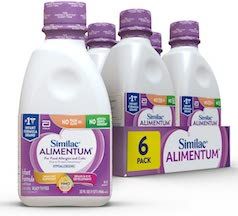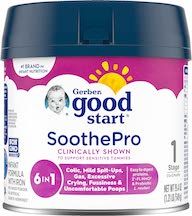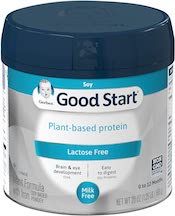Best Formula for Gassy Babies to Supplement with Breastfeeding
Is your baby suffers from constant gassiness? These formula on our list will help your babies without the side effects that other formulas have.

Gas is quite common in babies. That's often because their stomachs aren't fully developed yet. However, food sensitivities and intolerances can cause gas in both formula-fed and breast-fed babies. Even though gas is common, it might be uncomfortable for your baby, especially if he has a sensitive stomach.
If your baby has frequent bouts of gas, constitution, or acid reflux after feeding, it may be the formula. Colicky babies are usually inconsolable and have bouts of frequent, intense crying.
The good news is you can choose from a variety of formulas, some specifically designed for gassy babies or those with sensitive stomachs. Gas buildup in the intestines can cause pain in babies and children. If your child has any of these signs, he may be experiencing more than just simple baby gasses. These could be signs of colic or a milk allergy.
Best Baby Formula Options
Too overwhelmed by all the formula choices out there for your baby? A trip to the grocery store in the formula aisle can be overwhelming for even the most experienced parent.
There isn't one single formula that works best for every baby. All infant formula sold in the U.S. has to undergo the same nutritional and safety tests. It doesn’t mean that all formulas are the same.
There are 3 different types of formulas. The powdered and liquid formula must be mixed with water for babies. Ready-to-use bottles contain a diluted formula that’s ready for feeding.
Cow’s milk is usually the first choice when making formula for babies, but you can also use soy and protein hydrolysates if needed. Follow the manufacturer’s directions for mixing the formula. Adding too much water can lower the nutritional value, while not enough water can harm a baby‘s delicate organs.
Breast milk is the best food for babies. Both the American Academy Of Pediatrics (AAP) recommend breastfeeding exclusively for the first six months.That being said, not all parents choose to breastfeed their babies. It is a personal decision.
How We Chose
We're not saying that one brand has been proven better than all the rest.
A comprehensive review of breastfeeding in American Family Physicians shows that there’s not enough evidence to support any particular type of formula. They’re nutritionally interchangeable.
So, in making our list, we looked at these formulas for things like helping babies' tummies, ease of use, availability in stores, and overall value.
Your baby may do better on one formula than another because of very individual reasons. Always speak with your pediatrician if you have any questions about your baby’s nutrition or digestion.
Formula for Babies with Gas, Constipation, and Reflux
Some babies can't tolerate regular milk. They might need a special formula containing different proteins or carbohydrates. These products may be labeled “help with fussiness, colic or gassiness in babies.” Other specialty formulas include:
Hypoallergenic formula: This product still contains protein (casein or whey). They’ve been broken into smaller, broken-down proteins. It’s often referred to as “predigested” or “elemental".
Lactose-free formula: Some babies have lactose sensitivity and cannot digest lactose. This formula type replaces milk with another naturally occurring sugar, such as glucose or fructose.
Baby formula for acid reflux: If your baby vomits after eating, doctors may recommend an anti-reflux formula. It has a thicker texture than regular milk, which helps babies keep the formula down.
Soy formula: Soy formula replaces cow’s milk as the main protein. It is often used by vegan families or as a personal preference.
Best Baby Formula for Gassy Babies
Best for Colic
If you’ve started linking your fussy baby’s crying to what they’ve eaten, consider choosing formulas specifically designed to address what’s causing those cries. However, there’s no evidence that a specific formula will make your baby healthier.
Colic usually gets better by your baby’s 4-6 months of age. The colic formula may not be helpful if your baby has an allergy, so you might want to talk to your doctor to see if there’s anything else going on with his health.
Similac Alimentum Hypoallergenic Formula

This hypoallergenic, lactose-free, ready-to-feed formula with 2'-FL HMO starts reducing colicky crying due to protein sensitivity within 24 hours. The reason why it's effective as a sensitive formula is because it contains proteins that have been broken down to avoid allergic reactions and is safe for infants' stomachs that can't digest proteins, making it perfect for both babies with gas and other digestive issues.
It can be a healthy alternative for sensitive babies with milk protein allergies. It is suitable for lactose sensitivity and has DHA and ARA, unique nutrients found in breast milk that are crucial to help support brain and eye development.
Best for Reflux
Are spit-ups becoming more than just a household issue? Breastfed babies have higher levels of reflux than formula-fed babies. These issues usually peak at around 4 months.
Some formulas use rice to thicken them. They may help decrease the frequency of spit-ups.
Gerber Good Start SoothePro

Designed to mimic the complete nutrition and gentility of breastmilk, the formula offers nutrition for babies from birth to 12 months experiencing colics, excessive crying, fussing, and gas.
It contains partially broken down whey protein, (2’-FL HMO Prebiotic), and probiotics. It can help promote good gut health in sensitive babies.
It can also help ease gas, fussiness, colic, and spit-up. It contains prebiotics and probiotic bacteria. It promotes a healthy digestive system. the formula also includes the probiotic Lactobacillus Reuteri, an important bacteria for improving many of the symptoms related to digestive issues in infants.
Best for Gassiness
Those toots might seem cute at first. Your baby may be uncomfortable with gas. If you experience severe gas, keep in mind that it could be a sign of an allergy or other medical condition. If switching formulas don't help, then go in for a check-up.
Gerber Good Start Soy-Based Formula

This lactose-free formula provides plant-based protein along with calcium and vitamin D for strong bones and teeth.
It is a safe alternative for sensitive babies with cows milk protein allergies. Contain Omega-3 DHA, important nutrients found in breast milk, which comes from algae to provide babies' brain development.
This formula also contains an abundance of omega-3 DHA to help nurture and develop your baby‘s brain and eye development. Many mothers are happy with this formula and think it seems to help their babies.
It does a great job at relieving the symptoms of gas but has also worked well for babies with colic, so sensitive tummies will agree with this formula.
How to Treat Gas in Babies
Massaging an infant's tummy when they're fussy and showing signs of tummy troubles can help. Lie your baby on his/her back and rub in a clockwise motion to help with gas issues. Another way to get your baby moving is to gently grasp her ankles and rotate her legs in a circular motion.
Tummy time is an effective way to help move gas bubbles through the digestive system. Besides these at-home methods for treating gas, Mylicon is an over-the-counter gas relief drop for babies who are experiencing gas.
What to Consider in Formula-Fed Babies
If your baby experiences excessive gas after drinking formula, consider reviewing the following factors to see which might be causing the problem.
These gentle, sensitive, and comfortable infant formulas provide specific protein and sugar profiles for babies who may not tolerate standard formulas. For example, some foods contain partially digested milk proteins that may help ease gas.
Lactose-free formulas contain sugars other than lactose that is naturally found in cows' milk. It's worth noting that lactose is also one of the types of sugars found in breast milk. Most breastfed infants tolerate lactase without any problem.
Because children usually don't develop symptoms of lactose intolerant until they're between 2 and 5 years of age, switching them to a lactose-free formula isn't necessary unless they have a viral infection (like rotavirus) that causes severe diarrhea. If lactose intolerance causes your baby's gas, he/she will probably experience bloating, cramps, and diarrhea in addition to gassy tummies.
Cow's milk allergies are relatively uncommon in infants and children. However, when they occur, they often cause both digestive and non-digestive symptoms. Symptoms can take up until 48 hours to begin after you eat, and may include: diarrhea, hives, respiratory symptoms, swelling, and vomiting.
While switching from a milk-based formula to an alternative formula may be recommended for some babies with cow milk allergies (CMA), the switch does not always help. If you're having trouble with your baby's eczema, consider trying a hypoallergenic formula instead.
It's important to keep in mind that protein and sugar in milk formula are two different things. Most babies who have milk protein allergies can still tolerate lactose. A pediatrician or pediatric nutritionist can help you choose the right formula for your baby.
How to Choose Baby Formula
There’s no right or wrong choice when it comes down to a formula. As long as is safe to use, then you're free to buy whatever you want.
You might wonder if a particular brand or type of product is right for you.
- is easy to find online
- is affordable for you
- meets your need (powder or liquid)
- is appropriate for your children’s special needs
Beyond that, you'll need to figure out what works best for your child. Most formulas contain 20 calories per 8 ounces. Unless your doctor tells you otherwise, you should choose one that contains iron to help prevent iron deficiency.
Any additional ingredients added to the formula, including fatty acids and other ingredients found in breast milk, are completely safe, but may or may not provide any of the benefits listed on the box.
What to Consider in Breast-Fed Infants
Breastfeeding moms should only consider gas a concern if it is excessive or accompanies other symptoms. The following are possible causes of gas in your breastfed infant.
Parent's Diet
Breastfeeding mothers were once told that avoiding certain foods (such as dairy products) from their own diet could improve their babies' digestion Newer research has shown that the food in a breastfeeding mother's diet doesn't always affect her infant's physical symptoms. The caveat to this rule is for babies who have CMP or other immune-mediated food allergies.
If parents with a breastfed infant experience painful gas, they may want to eliminate milk and milk products from the diet for a week or 2. If your baby's digestive system improves, he or she might have an allergy to cow's milk protein.
Milk proteins from your diet that pass into breast milk may still be the cause of an allergic reaction. Infants with this disorder also typically have bloody stool. Breastfeeding mothers should not restrict their diet excessively. Some mothers give up breastfeeding because they believe that they must avoid certain foods.
Breastfeeding mom should eat a varied, nutritious, balanced diet. Talk to a pediatrician, nutritionist, or lactation consultant if your breastfed baby has painful gas. Parents who breastfeed should only consider gas a concern if it is excessive or accompanies other symptoms.
Baby Formula FAQs
When is it time to consider switching formulas?
A little spit-up or gas isn't necessarily a sign that you need to buy a new bottle. All babies vomit. If your child is gaining weight at an appropriate rate, the spit-up isn’t a big deal.
However, consult with a pediatrician and discuss trying a different formula if you see any of these symptoms: lots of spit-up after meals, crying after feedings, vomiting projectile, poop blood, and no weight gain.
Which type of formula should you try first?
Before changing your child’s formula, speak with your pediatrician first. Your doctor can recommend the type of formula that may work best for your child’s symptoms.
If your child has colic and you're looking for a solution, your doctor might suggest a lactose-free formula first. If your baby is arched his/her back after feeding, your physician may prescribe an anti-reflux medication. You may even find out that the child’s symptoms aren’t related to the formula you’ve been using.
Why is my formula baby so gassy?
Gas in babies could be caused by a sensitivity or milk protein allergy. Fact: Sometimes it’s the immaturity of a baby’s digestive system that causes gas. But sometimes gas in a baby could be a sign of an underlying issue, such as allergies or sensitive tummies.
How long does it take for a baby to adjust to new formula?
Give your baby at least 3 to 5 days to try the new formula. Some babies will adjust immediately. Other children may have slight changes in their stool pattern, gas, or spitting up until they become accustomed to the new formula. Ask your baby's doctor if you have any questions or concerns.
How do you know if the formula doesn’t agree with the baby and has a gas issue?
- Reduced appetite is another common symptom
- Refusing to drink the formula
- Excessive crying during or after drinking
- Loose, waterier than normal stools
Final Thoughts
There are many formulas available. Breast milk is always the best option for healthy babies, but all formulas will meet the basic nutritional requirements of your baby.
Your baby’s doctor may help you decide which is the best formula for gassy babies. They may even give you some free samples or coupons so you can try them before buying.

